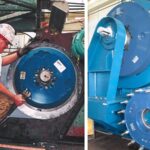What is Air Balancing and Why is it Important for Your Home In San Antonio?
When it comes to indoor air quality, there are many different factors that need to be considered. There are common smells or scents that indicate the presence of bad indoor air, and the humidity and temperature of the air also play a role in determining if the air is clean or not. The way we measure the balance of indoor air is known as “air balancing”, which refers to measuring and controlling how much fresh air is being supplied into a home vs. how much stale inside air is being released back into the environment. A balanced amount of indoor air means there isn’t an abundance of CO2, moisture, heat, or odor present in your home. It also has implications on how well your HVAC system performs and how comfortable you feel while you are at home. If you are in need of AC repair in San Antonio, it is important to find a reputable company that can help you achieve a balanced indoor air quality.
What Causes Imbalanced Air in Our Homes?
The easiest way to describe what causes imbalanced air in our homes is to think of it as a “toolshed” full of gases. Some of these gases are beneficial for humans, but others may be harmful or even deadly. The ideal situation is when nothing escapes the shed, and nothing new enters the shed. Unfortunately, this is not the case in most homes. Some common indoor air quality issues include CO2 build-up, moisture and humidity, dust, odors, and poor air circulation.
- CO2 Build-Up: Carbon dioxide is a naturally-occurring gas that is found in indoor environments. While it’s normal to have some CO2 in the air, levels that are too high can make you feel sluggish, cause headaches, and make it harder to fall asleep at night.
- Moisture and Humidity: Excessive humidity indoors can cause a variety of health issues, including mold, corrosion, and structural issues. The best way to prevent this is to use a dehumidifier.
- Dust: Dust can cause allergies, asthma, and other respiratory issues. The best way to prevent this is to use a HEPA filter in your air vents.
- Odors: Bad smells are usually caused by an issue with the air quality in the home. It’s important to find the source of the problem and fix it as soon as possible.
- Poor Air Circulation: If there is not enough airflow in a room, it can lead to bad smells and high humidity. Install ceiling fans and make sure your HVAC system is working properly to keep the air moving.
HVAC System Malfunctions
If your HVAC system is not working properly, it could be causing a buildup of CO2 inside your home. This could make you feel lethargic and tired, and could also lead to headaches and nausea. CO2 can also be dangerous for small children and pets in the home. If you think your HVAC system is not working properly, you should call an air condition repair San Antonio company to come and take a look. The most common HVAC system malfunctions include a dirty or clogged air filter, a broken or clogged rooftop unit, and improper ventilation settings. Additionally, any time your HVAC system has to work harder, it puts more stress on the system. This could cause it to break down sooner and could lead to an increase in electricity usage.
Poor Ventilation and Circulation
Bad ventilation and poor circulation can cause CO2 levels to rise and odors to become trapped in a room. Poor circulation can also lead to moisture issues in the room and could cause your HVAC system to run longer than it needs to. AC maintenance San Antonio company can help prevent these issues. To prevent these issues, it’s important to make sure your air ducts are properly insulated and that you have good ventilation in every room in the house. If you have rooms with poor ventilation, you may want to consider getting an exhaust fan for the room or hiring an HVAC contractor to install a whole-home ventilation system.
Existing Building Materials and Construction
The materials used in your home’s construction and the design of your home could be contributing to poor air quality. Homes built before 1975 may contain asbestos in their construction materials, which could lead to an increase in CO2 levels. Additionally, homes with poor ventilation and no air conditioning run the risk of having high humidity levels. Homes with solid walls and few windows tend to trap smells and dust, making it harder to keep indoor air quality high. CO2 is also more likely to be trapped in homes with solid walls. Air duct cleaning San Antonio can help improve the quality of your home’s air. HVAC ducts are a vital part of your heating and cooling system, but they are often ignored until something goes wrong. The fact is that keeping your ducts clean will help your HVAC system work more efficiently and keep your home comfortable all year long.
Strategies for Improving Indoor Air Quality
One of the best things you can do to improve indoor air quality is to clean your air vents and air filter on a regular basis. You should clean your air vents every three months and your air filter every three to six months, depending on the filter. It’s also important to make sure your HVAC system is working properly and that the air ducts are insulated. You can also improve indoor air quality by making sure the windows and doors are open from time to time to let in fresh air from outside. You can also use an air purifier or air filter to trap dust, odors, and other allergens in the air.
Conclusion
Air balancing is necessary for good indoor air quality. If the air is not balanced, it can lead to issues like poor air circulation, poor ventilation, a buildup of CO2, and moisture. The best ways to prevent issues with air quality are to clean your air vents regularly, make sure your HVAC unit is working properly, and open the windows and doors from time to time to let in fresh air from outside.
















